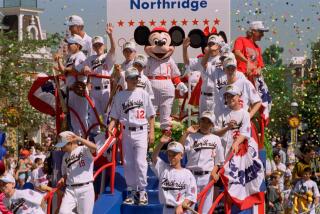Springtime Hope for a Frail’s Father’s Late-Inning Rally
Of failing fathers and rites of renewal. . . .
One of my favorite pictures of my father shows him in his early 20s, wearing a St. Louis Cardinals baseball jacket and holding a cigarette. I must say, the old man looked pretty studley.
The yellowing pages of his scrapbooks from the ‘40s suggest that he was a good ballplayer, but after the Cardinals traded him to the White Sox, who then wanted to send him to some distant minor league outpost, he decided to bag it and concentrate on the real world.
But to me, he’s always been a ballplayer. As a kid, I’d spend hours leafing through his scrapbooks, getting a special charge from seeing his name listed among the leading hitters of some obscure minor league in Minnesota or of seeing “Parsons, 3B-SS,” in the box score from an equally obscure league in Louisiana.
Like most sons, I thought Dad was invincible--the perfect combination of wisdom and strength. The fact that he had played pro baseball--something none of the other kids could claim about their dads--only reinforced the feelings. When the kids in our little Nebraska town went out to play ball, no one else’s dad would horse around with us and hit the ball out of sight.
It was a feeling that never really went away: In about 1970, I was playing in a fast-pitch softball league, and we were short a player for a tournament game. Friends told me to ask Dad if he could fill in for a game, and he agreed. I was nervous, wondering if the old ballplayer, then 47, would embarrass me by performing poorly in front of my 20-year-old teammates. He embarrassed me, all right: He hit two home runs, hitting them so far that even in his middle-aged waddle around the bases, he beat the throws home from the outfield.
Over the years, he taught me about the game. He never had the idealized love for baseball that I developed, but he instilled in me an appreciation for it.
He taught me how to read a box score and how to make sense of the statistics that bind one generation of baseball fans to the next. He talked about Ruth and Gehrig, and as a result I couldn’t read enough lore about them. To my 10-year-old eyes and ears, the two Yankees of the 1920s seemed like mythological giants who played in some prehistoric era. It’s a little disconcerting to realize now that I was no more removed in time then from Ruth and Gehrig than today’s 10-year-olds are from Mays and Mantle.
He taught me that with every spring comes hope, that last year’s lousy team can wipe the slate clean and start again. With each new season, he said, comes the chance for redemption.
I probably never fully understood then. I do now. As adults come to learn in ways that 10-year-olds can’t, life is full of little allegories.
So I noticed last week.
I was visiting my parents, still ensconced in the Midwest and hoping that the balmy weather that the first of April brought was the real thing and not a decoy.
I leafed through the old pictures of Dad again, with him looking as fresh as a colt. On the pages of the album, he was 25 and nimble and athletic again.
Then I looked across the room at the real thing. Damn, how time marches on.
He’s 68 now and in the advanced stages of heart disease. He’s also been doing kidney dialysis treatments for the last four years. The guy who used to brag about his keen eyesight in the batter’s box has cataracts and is impatiently waiting for the effects of the surgery to restore some eyesight so he can drive again. Over the winter, his blood count wouldn’t stabilize and he had a couple scary moments in the hospital. His weight is down to 147 pounds.
He’s frail now, this once-muscular athlete who lettered in all four major sports his senior year in high school. His idea of strenuous exercise is to walk down to one end of the carpeted hallway of his apartment building. He lies in bed at nights, sometimes sleeping through but too often moaning from various pains.
He’s tired, he says, of fighting the good fight.
Last week, we watched a couple of exhibition baseball games on cable and talked about another upcoming season, just as we have every April for the last 30 years.
As a child with a heroic father, I did it just to be in his presence and talk baseball. As an adult now with an ailing father, it’s much more about a rite of renewal.
Watching him napping in midafternoon or laboring just to go check the mail, I realized there will be a cold spring someday when we won’t have that conversation anymore. But for this year, for yet one more season, we got to do it again.
It’s always fun to celebrate the advent of another baseball season, when hope springs eternal and when it’s not unrealistic to make fervent pleas for amazing comebacks.
More to Read
Go beyond the scoreboard
Get the latest on L.A.'s teams in the daily Sports Report newsletter.
You may occasionally receive promotional content from the Los Angeles Times.










